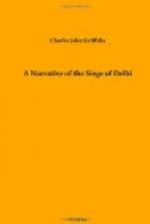September 2 and 3.—The batteries continued exchanging shots during September 2 and 3, but there were no attacks of any consequence on the pickets, and we had on those days only three men wounded on the right of our position.
On the morning of the 4th the long-looked-for siege-train reached camp. It consisted of twenty-four heavy guns and mortars, and a plentiful supply of ammunition and stores. Reinforcements also reached us, amounting to about 400 European infantry and the Belooch battalion, the last a most savage-looking lot of men, who, however, did good service, and fought well. Besides these, a party of Sikh horsemen, in the service of the Rajah of Jhind—a noble-looking man, who, with his retainers, had kept open our communications with the Punjab during the whole siege—joined the army, begging as a favour that they might join in the dangers of the coming assault on the city.
September 7.—September 7 also saw the arrival of Wilde’s regiment of Punjabis, 700 strong, followed the same day by the Kashmir contingent of 2,200 men and four guns, sent to our assistance by the ruler of that country.
I was sitting in my tent with the bandmaster of my regiment, a German named Sauer, when we were saluted with the sound of distant music, the most discordant I have ever heard. The bandmaster jumped up from his seat, exclaiming: “Mein Gott! vat is dat? No regiment in camp can play such vile music,” and closing his ears immediately, rushed out of the tent.
The Kashmir troops were marching into camp, accompanied by General Wilson and his staff, who had gone out to meet them, their bands playing some English air, drums beating, and colours flying. There was no fault to be found in the appearance of the soldiers, who were mostly Sikhs and hill men of good physique; but their ludicrous style of marching, the strange outlandish uniform of the men, and the shrill discord of their bands, created great amusement among the assembled Europeans, who had never seen such a travesty on soldiers before. They encamped on our right flank; but were not employed on active service till the day of assault, on September 14.
On the arrival of the siege-train, no time was lost in making approaches and parallels, and erecting batteries for the bombardment of Delhi. The trench-work had already been begun, and what with covering and working parties, both of European and native soldiers, and the usual picket duties, the greater part of the army was continually employed in this arduous work every night and a portion of each day. Nothing could surpass the zeal and willing aptitude of the men, who laboured unceasingly digging trenches and filling sand-bags, all the time, and more especially at night, exposed to a galling fire of musketry and shells.
The Engineers, under their able leaders, were unremitting in their duties; and the young officers of that corps covered themselves with glory both in these preliminary operations and at the actual assault.




